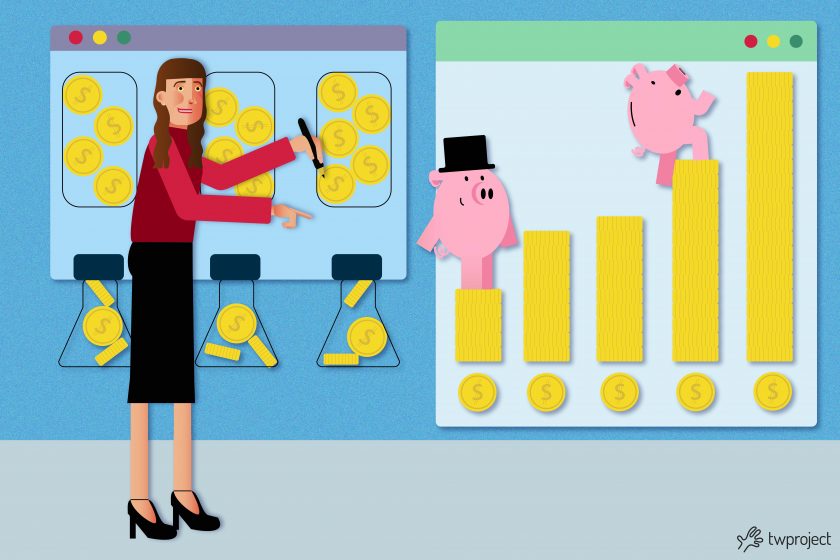Most of the time, bad financial planning leads to project failure or late delivery.
Solving this issue is not easy, but in this article, we will provide tips on how to improve project financial management and the best tools for it.
CONTENT
What is project financial planning?
Financial planning is the art of managing all financial matters in a project, from expenses to potential excess funds.
This process includes estimates, budgeting, risk management, and financial reporting.
The primary purpose of project financial management is to ensure that the work is completed within the given budget while achieving financial goals.
Someone has to manage all financial transactions, like expenses or payments received, throughout the project life cycle.
Usually, the project manager works alongside a finance manager to set the budget and monitor expenditures, but these figures can change depending on the size of the company and industry.
Successful financial management helps the project manager optimize resource allocation, manage risk, and make informed decisions based on real-time financial data.
Getting it right can make the difference between the success or failure of a project.
Financial planning throughout the project life cycle
Typically, financial planning is done in stages that align with the different phases of a project’s life cycle. These are:
• Launching phase: Here, the financial situation of the project is assessed according to the business capabilities.
• Planning phase: The actual financial management begins after project feasibility is confirmed. Project budget and expense allocations are synced with key activity milestones.
• Execution phase: As the project team focuses on completing assigned tasks, the budget must always be monitored to catch any deviations in costs and expenses in time and take improvement measures.
• Closing phase: Here, it is imperative to conduct a financial review to assess the return on investment (ROI) and overall financial impact of the project.
Common challenges of project financial planning
Managing a project’s financial statement is a task that involves critical thinking, analytical, and problem-solving skills.
The following are some common challenges of project financial planning:
• Unexpected costs: You can painstakingly plan a project, yet unexpected expenses can arise that cause the budget to go over budget. These can be caused by errors in procurement or macroeconomic factors, such as changes in the market that are beyond your business’ control.
• Inaccurate budget projections:Budget creation is a complex process that requires rough forecasts of future events, such as the cost of materials, staffing, and other expenses.
• Cash flow management:Even if the overall budget is accurate, delays in funding or payments can stall progress. It is challenging to sustain a steady cash flow successfully, but it is necessary to monitor the budget closely.
• Scope creep: During the project life cycle, stakeholders may request additional features or changes that were not initially considered. This translates into project costs that can escalate if not proactively checked.
• Poor communication: Clear communication among all parties is a vital requirement for effective project financial management. Poorly managed communication can alter a project’s financial balance due to duplicate efforts, missed payments, or misallocated funds resulting from a lack of transparency or misunderstandings.
Twproject: the best project financial planning tool
Traditionally, businesses have managed their finances manually, such as spreadsheets.
However, in today’s marketplace, which presents many more variables than in the past, most organizations have transitioned to more automated solutions.
Financial information must be relevant, timely, and accurate. It must provide a true picture of performance and fact-based information needed to make realistic predictions about future performance.
This is why choosing project management software with accounting capabilities enables it to support long-term project planning.
Twproject is a tool designed to support companies of all sizes and industries.
This software offers a range of functionality for both day-to-day project activities and broader enterprise-wide efforts.
Twproject supports project budgets of all kinds; moreover, complex budgets can be broken down into multiple phases to simplify financial management.
Budgets can be monitored at any time, and all changes made are automatically applied to the data in real-time.
Twproject also sports a custom reporting feature that allows you to add all those key parameters for a specific project to the documentation.
These reports can be shared with relevant parties by arranging views on the dashboard or scheduling them to be sent via e-mail.
These features, and others that Twproject offers, help project managers manage the complete project picture while simplifying collaboration and communication with the team.
As we have discussed, optimal financial planning is vital to the success of a project and a company in general.
Every step is critical, from the opening assessment and estimation to monitoring and adjusting for changes during project execution and the full financial review at closure.
Implementing project management software such as Twproject, which can manage a business’s budget and overall processes, is, therefore, a major advantage.




